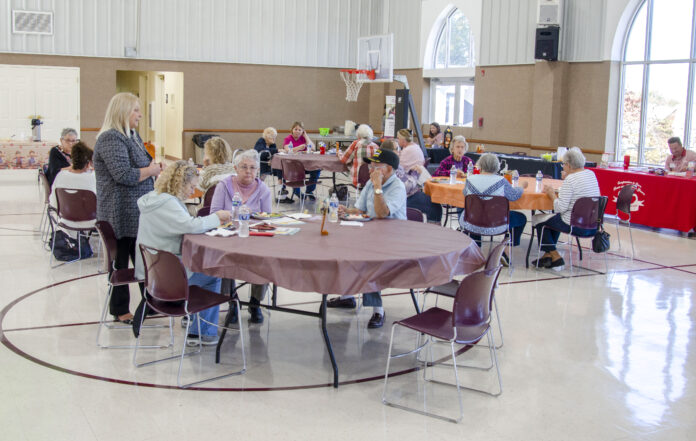By Don Steen ~ Staff Writer n reporter@psci.net
Dementia Friendly Spencer County hosted its third annual Salad Lunch & Learn and Vendor Fair Thursday at Trinity United Methodist Church. The event was organized alongside Southwestern Indiana Regional Council on Aging and the Alzheimer’s Association. Several local organizations serving the community were also present to offer information and resources to those in attendance.
This year’s speaker was Becky Vogel, a community educator with the Alzheimer’s Association. She offered some tips on how to raise the topic of dementia, Alzheimer’s Disease, and similar conditions with loved ones starting to show symptoms.
These conversations are difficult, as they focus on accepting that something is wrong, that there are few prospects for recovery, and how to gradually ease into that new paradigm. Vogel centered her presentation on the initial push to see a doctor, convincing a loved one they can no longer drive safely, and establishing long-term plans as well as preparing documents and billing schedules.
Vogel emphasized there is no perfect way to address these issues, nor a set order. Indeed, she noted that establishing a plan for power of attorney in the event of incapacitation is a generally good idea for anyone regardless of age, as a car accident can easily put someone in that position. Sometimes it may be easier to raise these topics without directly broaching the subject of dementia, relating them as practical advice for anyone as they age.
“Not everything works for everyone,” said Vogel.
Still, there are some things a caregiver has to address at some point. Even firmly establishing a diagnosis of dementia or Alzheimer’s can be difficult, but it is critical.
Vogel pointed out that caregivers are often close family, a spouse even. As these debilitating conditions come on gradually, the symptoms can be written off as minor quirks at first. Eventually, people might simply become accustomed to doing certain things for their loved ones, taking on these responsibilities a little bit at a time.
“You don’t even realize you’re doing it,” she said.
Indeed, an outside perspective is often necessary to see these symptoms for what they are. However, family can be just as resistant to accepting that a loved one has a life-changing condition as the patient themselves.
Vogel noted that these conditions are daunting for many reasons. Once a diagnosis is given, it becomes “real”. The symptoms can’t be written off or ignored any longer. It becomes an all-encompassing part of one’s life, and that of their family. Even worse than the physical and mental symptoms, there is a very real fear that one’s social life will deteriorate due to the stigma of these diseases.
“It becomes very isolating,” said Vogel.
For these reasons, broaching the subject of “seeing a doctor” requires a certain finesse. Vogel said it is helpful to keep note of symptoms and incidents and plan conversations ahead of time, while also being prepared to back off and try again later. She said it is important not to be accusatory, and avoid ganging up on someone. It is better to talk when everyone is relaxed, gradually letting them make the decision to see a doctor in their own time.
Vogel suggested making a visit to the doctor in a roundabout way, such as pointing out Medicare’s free annual wellness visits. An innocuous checkup, paired perhaps with some questions prepared for the doctor, can make things easier. She also advised pairing the doctor’s visit with an enjoyable outing, such as a lunch, to take some of the anxiety out of the situation.
Caregivers can also point out that there are other conditions that can bring about dementia-like symptoms. An expected terminal diagnosis may result in something treatable instead, that can quickly improve quality of life. Even if the worst should come to pass, treatments, planning, and other resources can help make life easier. After all, avoiding a diagnosis will not put off progression of the disease.
“It’s not going to go away,” said Vogel.
Once that initial hurdle is cleared, a caregiver needs to recognize the various stages of the disease and how to help their loved one manage these transitions. Vogel noted that a diagnosis does not mean that a life is over. They can still drive and live independently for a time.
Read more on this story in this week’s issue of the Spencer County Leader!
Featured Image: Attendees socialize at the Lunch & Learn event while awaiting speaker Becky Vogel’s presentation


Pictured from left: This year’s speaker, Becky Vogel, is a community educator with the Alzheimer’s Association. Attendees were treated to a delicious array of salads and other side dishes at the Lunch & Learn event






